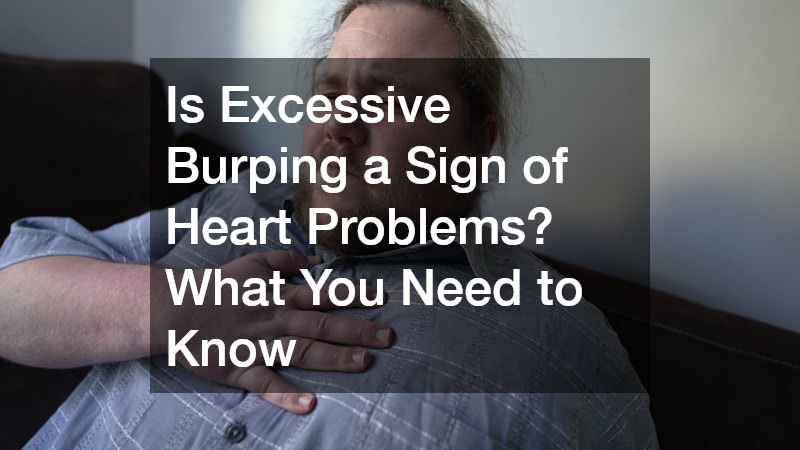Burping is a natural bodily function that helps release air from the stomach. For most people, it’s just a minor nuisance after eating or drinking too fast. But when burping becomes excessive or occurs alongside other symptoms like chest discomfort, some people begin to wonder: Is excessive burping a sign of heart problems? While the answer isn’t always straightforward, it’s important for health-conscious individuals to understand when burping is harmless and when it could indicate something more serious.
In this article, we’ll explore the potential links between burping and heart conditions, what other symptoms to watch out for, and how to tell if your heart is healthy. Whether you’re someone who values preventive care or is simply curious about your body’s signals, this guide will help you better interpret what your burping may (or may not) mean for your heart health.
What Causes Excessive Burping in the First Place?

Burping, also called belching, typically results from swallowed air that accumulates in the stomach and is expelled through the mouth. Common causes include:
- Eating or drinking too quickly
- Carbonated beverages
- Talking while eating
- Chewing gum or smoking
- Acid reflux or indigestion
In many cases, these causes are not serious and can be addressed with lifestyle changes. However, excessive burping that occurs regularly, especially without obvious triggers, may warrant a closer look.
Can Excessive Burping Be a Sign of Heart Problems?
Yes, in some cases, excessive burping may be indirectly linked to heart issues, especially if it appears with other warning signs. While burping itself is usually gastrointestinal, there are overlaps between heart-related and digestive symptoms that can create confusion.
When Burping Might Be Cardiac-Related:
Burping associated with heart issues often occurs in combination with other symptoms, such as:
- Chest pain or pressure
- Shortness of breath
- Nausea or lightheadedness
- Fatigue
- Pain in the neck, jaw, back, or arms
These symptoms may appear in silent or atypical heart attacks, especially in women, older adults, and people with diabetes. The confusion often stems from the fact that indigestion and heart attacks can feel very similar. This is why being aware of your body’s signals and erring on the side of caution is crucial.
How to Tell the Difference Between Digestive and Heart Issues
For health-conscious individuals, knowing how to distinguish between gas-related discomfort and cardiac warning signs is key.
Consider the Following Questions:
- Is the burping accompanied by chest pain or tightness?
If yes, especially with radiation to the arm or jaw, seek emergency help. - Does the discomfort worsen with exertion and ease with rest?
This may point more toward a heart issue than digestive trouble. - Is the burping relieved by antacids or position changes?
This leans toward gastrointestinal causes.
If you’re unsure, it’s always best to consult a doctor, especially if you have risk factors like high blood pressure, diabetes, or a family history of heart disease.
How to Tell If Your Heart Is Healthy

Many health-conscious people ask, How to tell if your heart is healthy? While medical diagnostics like ECGs and stress tests are the most accurate, there are daily indicators that can hint at your heart’s condition.
Signs of a healthy heart include:
- Good stamina and energy levels
- Normal blood pressure and cholesterol
- A healthy weight and BMI
- Steady pulse and normal heart rate variability
- No unexplained chest pain or shortness of breath
To stay on top of your heart health, consider regular check-ups, heart-healthy diets, stress management, and consistent physical activity.
When Should You See a Doctor?
Even if you think your burping is likely due to digestion, it’s important not to ignore changes in your health.
Seek medical attention if you experience:
- Frequent, unexplained burping lasting more than a few days
- Burping accompanied by chest pain, shortness of breath, or nausea
- A feeling of fullness or bloating not related to meals
- Sudden fatigue or dizziness
These symptoms could point to more serious issues, ranging from gastrointestinal disorders to cardiac events.
Practical Tips to Reduce Burping
If your burping is more of a nuisance than a red flag, these habits can help reduce it:
- Eat slowly and avoid talking while chewing
- Skip the soda and carbonated drinks
- Limit gum and smoking, both of which increase swallowed air
- Watch your triggers, such as spicy or fatty foods
- Avoid tight clothing that compresses the abdomen
Tracking your symptoms in a health journal can also help identify patterns and triggers, giving your doctor more insight if you need to seek medical care.
Final Thoughts: Don’t Ignore Persistent Symptoms
Excessive burping isn’t always a cause for alarm, but it shouldn’t be brushed off, especially when paired with symptoms that could signal a heart problem. Understanding the subtle signs of heart disease and knowing how to tell if your heart is healthy empowers you to act early and wisely.
If you’re ever unsure whether your symptoms are digestive or cardiac, don’t hesitate to consult a healthcare provider. It’s better to investigate a benign issue than overlook a serious one.




